Illinois Issues: A Prescription For Fruits And Veggies
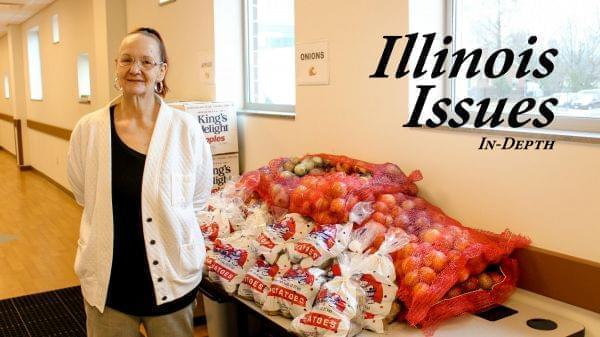
Susan Stolkes, a Springfield resident, stands in front of fresh produce being offered in January at the Central Counties Health Centers' food pantry. Katie Buck/NPR Illinois
On a Thursday morning in January, Susan Stolkes makes her first visit of the year to Springfield's Central Counties Health Centers on the city's east side. She's not there for a checkup, but to pick up fresh food to take home, as suggested by her physician.
"I've always tried to feed myself - and that's not always easy. I get $11 in [government food assistance], and produce is very expensive," says the Springfield resident, who lives in a senior residential complex near the health center. "Food insecurity is a real hardship for me."
The fresh fruits and vegetables she's picking up are delivered to the health center as part of a pilot program that began last year. Not unique in the country, it is one-of-a-kind in central and southern Illinois and aims to increase the use of health care as a way to address food accessibility problems.
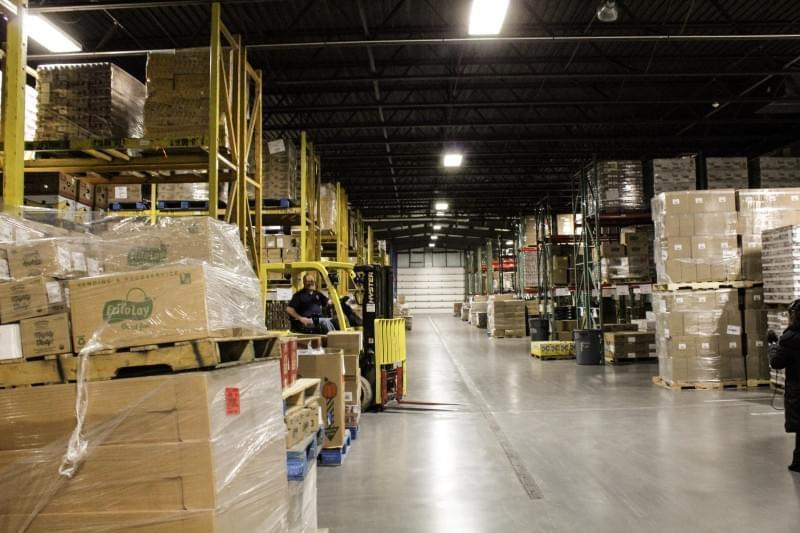
A look inside Central Illinois Foodbank's warehouse in Springfield.
Some experts advocate increasing partnerships between community organizations, food banks and health centers to develop tailored solutions. Communities in Sangamon and Cook counties are already forming such partnerships. Increasing awareness, especially of the health-related risks of living in poor food environments, is a pressing issue, some say. But with so many layers to the issue and so much diversity in communities, there is not one solution that can be effectively applied universally.
Sangamon County, where Springfield is located, had 27,160 residents facing food insecurity in 2015. That's out of the estimated 1.5 million food-insecure individuals across Illinois, according to the U.S. Census statistics from that year. That means 11 percent of households statewide are unable to predict where their next meal will come from. The issues revolve around economic instability and other socioeconomic factors.
Complicating the problem for many food-insecure individuals like Stolkes is living in a food desert, a neighborhood without a grocery store. Central Counties Health Centers serves a community considered to be both a food desert and a low-income area, according to data from the U.S. Department of Agriculture. In these food deserts, transportation and affordability are added to the already difficult mix. In many rural food desert communities, for example, the nearest food store can be anywhere from 10 to 20 miles away. In urban areas, while transportation options are available, food prices might be unaffordable for someone on a fixed income.
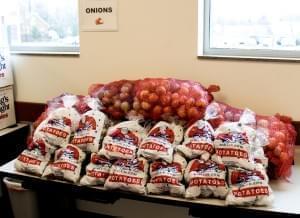
Potatoes and onions.
"The food accessibility issue is both a geographical challenge of people not being able to access the grocery store, but even some people who live relatively close to fresh food, they are not able to afford it," says Christopher Merrett, director of the Illinois Institute for Rural Affairs at Western Illinois University. His research looks at bringing economic development into communities that need it most.
Some community programs use technology to form partnerships with volunteers and other agencies. Kimberly Ann Keenan is program manager for the Gifts in The Moment "gitm" Foundation, which operates in Peoria, Tazewell and Woodford counties. Its Good Food Recovery Program uses ChowMatch - software that connects organizations to food before it goes bad at grocery stores or food banks. Keenan says this allows her organization to partner with all county health departments, as well as all health care-based organizations to deliver food where it is most needed. She calls it "Uber for food."
Keenan says more of this kind of collaboration is needed to cover and address the health impacts of food accessibility and amplify the issue with lawmakers and other community leaders.
"Food as medicine is hardly a new concept," she says.
Meanwhile, local food banks and health centers are making strides at conceptualizing the idea of "food as medicine."
One state lawmaker says a start to getting a solution is tracking food desert communities in the state.
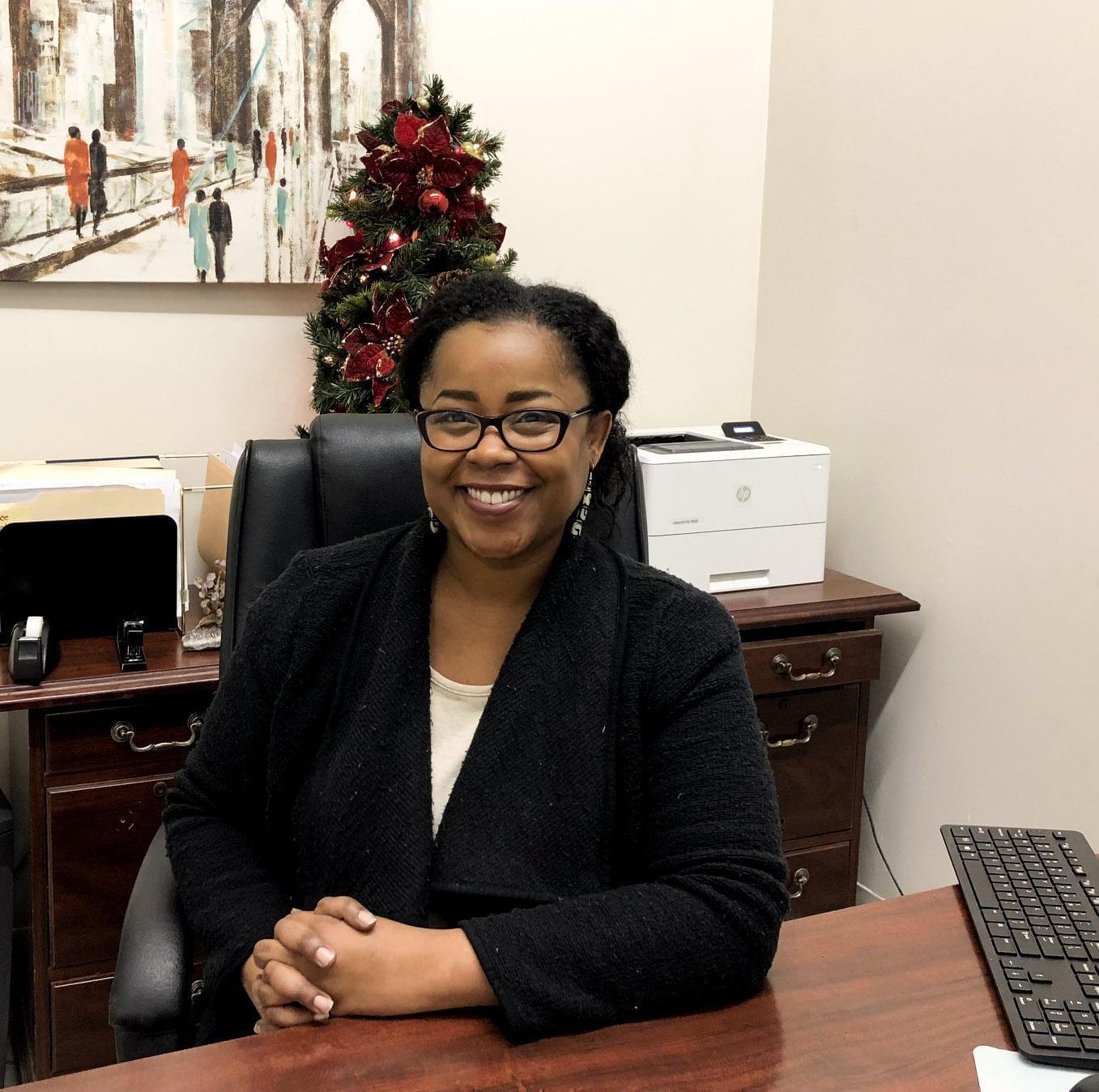
State Rep. Sonya Harper believes tracking food desert communities throughout Illinois will aid in finding a solution to the problem of food access.
State Rep. Sonya Harper, a Chicago Democrat, sponsored legislation that goes into effect later this year to mandate the tracking of food desert communities. The Illinois Department of Agriculture and the Illinois Department of Health will work together to send lawmakers annual reports on the health consequences of living within these environments.
Harper says she believes in the health-related connections and wants other lawmakers to review the issue in the communities they represent. At 36, she is the oldest living Harper in her family; her older relatives suffered from diabetes or heart-related diseases and died young. This, she says, is because of being raised in West Englewood, a neighborhood on Chicago's southwest side that has been classified by the U.S. Department of Agriculture as a food desert.
"Food is medicine. You can't do anything without it," Harper says. "We have literal cities and neighborhoods of people living without food. … They are going to end up needing some very costly care at some point in their life."
Local food banks and health centers are making some progress. Most recently, the Central Illinois Foodbank received a grant from the Walt Disney Foundation to deliver fresh food items to the Southern Illinois University School of Medicine's Family and Community Medicine and the Central Counties Health Centers, both in Springfield. Patients who receive care from these facilities can access the food pantries on site. Many times, physicians will encourage healthier eating habits as part of their patients' health care regimen or "prescription." In Chicago, John H. Stroger Jr. Hospital of Cook County screens food-insecure patients and sends them with coupons or vouchers to pantries for fresh fruits and vegetables to pantries or food trucks.
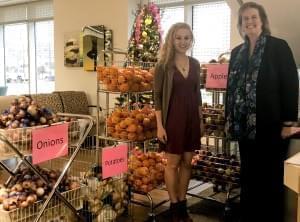
Dr. Janet Albers, right, and Cherry Hope at Springfield's SIU Medicine.
Dr. Janet Albers is chair for the Department of Family and Community Medicine at SIU Medicine. She's worked in the area of food accessibility for decades and says it's just now that diet and access to healthy food options have become integral parts of work for her and her colleagues.
"It's really hard for people to be healthy if I give out medicines, but they don't have enough food to eat, or if they don't have a place to live, or if they aren't able to have a job," she says. "I think that's something that, since I've trained, it's really changed our perspective."
And it's important to introduce these healthy eating options early in life, says Dr. Sameer Vohra, executive director for the Office of Population Science and Policy at SIU Medicine. He is also a pediatrician who has looked at the health issues children face when they don't have access to a good diet.
In vulnerable communities, families "are often malnourished," he says. "They are having failure to thrive. Or they are off the curb in terms of obesity. They're having higher cholesterol rates. They're having early onset diabetes."
Both Albers and Vohra say they hope the statewide tracking initiative will bring increased awareness to these health issues, but also to fill holes in the already available data on food deserts and to focus on overlooked areas.
"I think we all need to be more aware of where our patients are able to get food and transportation. If you don't have transportation, you're not going to get to a grocery store that's three miles away, right?" asks Albers.
While the statewide food desert tracking goes into effect in June, Harper plans to hold town hall meetings in affected communities to hear from those who work to improve food accessibility and health. She says she wants the data used by communities and lawmakers to implement change.
Mari Gallagher, who in 2006 popularized the term "food desert" in her report on Chicago's hunger issues, says she would like to offer her input if additional data will be collected. A researcher and consultant, Gallagher says the U.S Department of Agriculture already compiles data on food desert areas across the country by looking at low-income communities and their access to food, but might be lacking in some areas or overlooking some factors.
The report "has to be a very customized analysis," she says, for it to be meaningful and add to what's already out there. "There is not one single problem, and there is not one single solution to food deserts. Everything has to be looked at locally." Gallagher says she previously helped the state of Florida to map out its food desert areas and used specific methods, unique to Florida's communities.
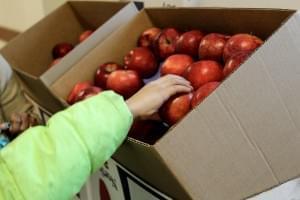
A young boy reaches for an apple, one of many produce items that are provided courtesy of the Central Illinois Foodbank.
So far, the initiatives in Sangamon County seem to be working - at least on a temporary basis. Patients at both SIU School of Medicine and the Central Counties Health Centers like the partnership with the foodbank, says Kristy Gilmore, the food and agency resources director for the Illinois Central Foodbank. The only logistical problem at its early phase was a shortage of food. A grant renewal added money to increase the amount to almost 2,000 pounds of food delivered at each site, each week.
The $15,000 Disney grant is slated to run out by July, but Gilmore says she hopes the partnership will continue in another capacity until additional funding is secured.
For Susan Stolkes, the Springfield resident who uses the food pantry services, this has changed the way she obtains food. She hopes the program continues.
"I used to order food online to pick up or be delivered to me," she says, but this was not affordable. "It's been difficult for me."
One day during a routine checkup, her doctor suggested she pick up some fresh produce on her way out, to help keep her healthy. That's how she learned of the food pantry, which is run on Tuesdays and Thursdays in the lobby.
Of the food and service, she says: "I love that it's produce, and it's produce I would use."
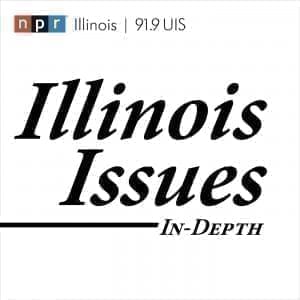
"I love it, love it."
Illinois Issues is in-depth reporting and analysis that takes you beyond the headlines to provide a deeper understanding of our state. Illinois Issues is produced by NPR Illinois in Springfield.
Links
- Illinois Issues: ‘Moneyball’ - The 2018 Illinois Governor’s Race
- Illinois Issues: For East St. Louis, A Glimmer Of Hope For Housing Revitalization
- Illinois Issues: New Illinois Laws In 2018
- Illinois Issues: Stories Of The Year
- Illinois Issues: Illinois Women Tell Their #Metoo Stories
- Illinois Issues: New School Discipline Philosophy One Year Later
- Illinois Issues: Campaign 2018 - Rauner Vs. Madigan
- Illinois Issues: Third Party Candidates Want Rules Eased To Get On Ballot
- Illinois Issues: Legislative Checklist - Veto Session
- Illinois Issues: Is The State Budget Balanced?
- Illinois Issues: Cities Lose Out On Retail Tax As Online Shopping Booms
- Illinois Issues: Land of Lincoln, New Jersey Compete For Worst Fiscal Condition
